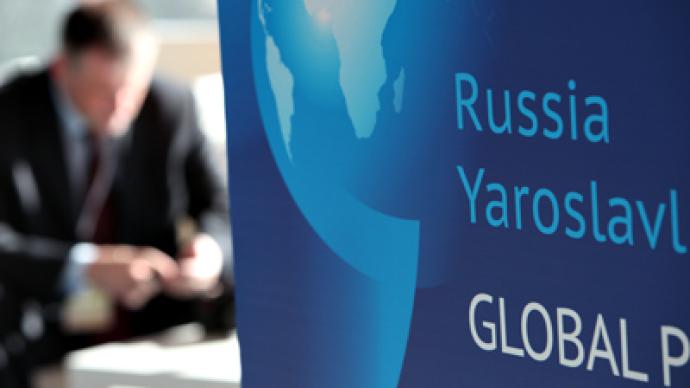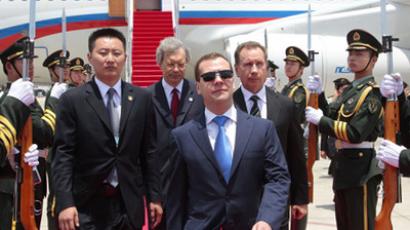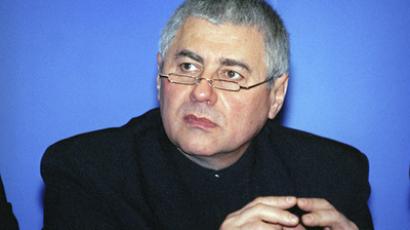Russia provides podium for dissenting East-West views

The ongoing East-West debate is largely conducted inside of cloistered think tanks and lecture halls, far removed from the subject at hand. The Yaroslavl Global Policy Forum aims to open a window on the conversation.
The mystery of the East-West relationship abounds with historical examples of mistrust, misunderstanding and outright hostility. It was a noted phenomenon long before communism had taken root in Russia, and long before Rudyard Kipling penned his famous poem, “The Ballad of East and West.” “Oh, East is East and West is West, and never the twain shall meet,Till Earth and Sky stand presently at God's great Judgment Seat;But there is neither East nor West, Border, nor Breed, nor Birth,When two strong men stand face to face, though they come from the ends of the earth!This may be interpreted as meaning that although geographic points on the map will never meet, it is still possible for representatives from very separate and distinct places to meet, engage in conversation, and listen to each other’s positions. They may even walk away with a greater appreciation for the people they once looked at as “the enemy.” After all, in this day and age, with the world littered with the most fearsome weapons imaginable, there is no substitute for deliberate conversation and deliberation. Yaroslavl has proven to be that sort of valuable venue.
Bringing together different worlds
“I think it’s highly effective,” commented Ian Shapiro, a professor of political science at Yale University. “It brings together academics and practitioners…who tend not to speak to one another very much.”Shapiro, who is in Yaroslavl this week for his third consecutive forum, said that he gets a perspective on the US-Russia relationship that has a tendency for falling under the radar of the American media.“(The Yaroslavl Forum) brings Russians and Westerners together. For me, it has always provided a very interesting perspective on what’s going on in Russian politics that you don’t get through the American media,” he said.Shapiro added that “you never know how good relations are until they are put under stress,” thus it is preferable to maintain “a high level of dialogue.” The Yale professor, who has written widely on questions of democracy, ventured to speculate that the future of Russian-US relations may be “held hostage to American domestic politics.”Shapiro noted that there may be big defense cuts down the road for the United States, which is presently tightening its belt in an effort to balance its books, and this could either halt or slow down plans for a US missile defense system in Europe. “In a pre-election year, it’s very unlikely that a Democrat running for re-election is going to want to appear weak on defense,” he said. “Unless budget issues drive it, I don’t think Obama will back (from missile defense). Now, if he’s reelected, I think it will be a different story. But in the next 12 months, Obama is going to have to appear very resolute on all defense issues.” Michael Mandelbaum, Director of American Foreign Policy at the Johns Hopkins School of Advanced International Studies, forwarded the same view in a recent article in Foreign Affairs, a prominent US political journal.“The August 2 legislation calls for $1 trillion in spending cuts over a ten-year period, about $350 billion of which is likely to come from the defense budget,” Mandelbaum writes. “When Americans are paying more to their government and getting less from it, they will not be as generous in supporting the United States’ global role as they have been in recent decades.”Meanwhile, the daunting question concerning Washington and NATO’s desire to build a missile defense shield in Eastern Europe – without Russia’s cooperation – poses the biggest threat to Russia-US relations since the Cold War era.Indeed, President Dmitry Medvedev warned recently on the risk of sparking “another arms race by 2020” if the two sides could not come to an agreement on the polarizing issue. These sorts of tough global challenges, which demand a vibrant forum for interpersonal interaction, are specifically what Yaroslavl is designed to accommodate.
Debate minus the "political correctness"
Meanwhile, Valery Fadeev, the editor-in-chief of 'Expert' magazine, and member of the RF Public Chamber Council personally witnessed the transformation of the Yaroslavl Forum “from a local event with a certain parochial bent to its current format.”He praised the forum for its “global perspective” that promotes an agenda that is “as relevant as possible, both for the world’s leading nations and the developing countries.”“What you can see from this year’s forum is that it has definitely expanded,” the Expert editor remarked. “It will have more venues, and it will provide more opportunities for discussion. This shows that the participants of this forum, both experienced and new ones, feel the need for this kind of interaction.”The Yaroslavl forum attracts the interest of so many scholars and policy makers because it “allows them to be much more outspoken,” he added.“As far as the essence of the forum is concerned, what’s interesting is that many foreign participants have spoken in favor of a more radical discussion – not in terms of revolutionary views to be expressed, but rather in terms of participants being more daring and straightforward in their discussions,” Fadeev said.He then mentioned the theme of the upcoming forum, “the modern state in the age of social diversity,” which, he believes, would be too “politically correct” a topic to consider in the West. “Western publics generally have quite a few restraints in discussing certain issues, such as social diversity, or the relations between various ethnic communities in European countries,” he said. “These PC tenets leave our Western colleagues with very little room for public debate, which either makes it outright impossible to find a solution through discussion, or on the contrary, drives the opponents into hard talk to the point of the discussion becoming unacceptable for many of its participants.”The Expert editor-in-chief praised Russia for its “straightforwardness.”“Here in Russia, strange as it might sound, we are used to being more straightforward and at the same time more lenient vis-à-vis our opponents. This candid attitude is of particular significance at today’s forum.”He added that the recent events in the UK will be on the agenda for the upcoming discussions. “Both the British public and the government have not been able to come up with an appropriate response to the issue of social diversity, apart from the use of force,” he said. “A police response should definitely be part of the solution, but there have to be other policies as well, for the society to be able to make a genuine change.”Another veteran participant of the Yaroslavl forum, Valery Tishkov, Director of the Ethnology Institute of the Russian Academy of Science, also said that the venue’s controversial theme is highly relevant to the modern situation.“This forum is different in its key topic, which is the social diversity of democracy and the modern state. This matter will be widely discussed by the forum members and I think the president will be speaking on it as well,” Tishkov revealed, who added that the conversation will “feature prominent scholars and political figures.”He added that the time is ripe for modern states to start to come to grips with how to “govern cultural diversity, by which we mean ethnic, racial, religious and language diversity. Due to mass migration among other things, today's states have the complicated nature of modern nations.”
The perils of multiculturalism
The problem of multiculturalism took front seat in the global debate following recent events in Norway, where a lone-wolf nationalist bombed a government building in Oslo, before opening fire on the participants of an isolated political camp. In total, 77 were killed, and almost 100 wounded. The attacker, Anders Behring Breivik, 32, said he planned the attack as a defense of “Christian Europe,” which he says is being "destroyed" by liberal immigration policies.Less than a year before Norway's horrific bloodshed, German Chancellor Angela Merkel spoke out about the “failure” of multiculturalism as a national project."We kidded ourselves for a while that they wouldn't stay, but that's not the reality," Merkel told a gathering of her Christian Democratic Union party in October 2010. "Of course the tendency had been to say, 'let's adopt the multicultural concept and live happily side by side, and be happy to be living with each other'. But this concept has failed, and failed utterly," she said. Tishkov, reflecting at length on these events, said “there are problems such as criticizing the policy of multiculturalism as well as the escalation of ultra-rightist, racist, and fascist views and practices.” In general, however, he believes it would be premature to “say goodbye” to multiculturalism.“We see that the European community is somewhat disoriented in the face of the need to integrate migrants and their descendants. Some strongly encouraging these people to get assimilated, while others are advocating a total ban on migration. I think we should find a happy medium,” he stressed. “In other words, we should preserve the traditions and cultural foundations and values of every nation-state, but at the same time these states and communities should not become altogether closed to labor migrants, or to people who seek their citizenship. It is hardly possible to back out — say, to send the migrants back home, or to impose monoculturalism on them — one language, one god.”On the point of religion, Tishkov said Russia and the West both provide good examples of successful multi-religious cultures.“We should also take into account Russia’s positive experience, where Islam and Christianity exist side by side without any religious wars,” he said. “The West, too, has accumulated some experience — say, in suppressing violence and lawlessness, things we witnessed in some European cities recently."Therefore, the goal of the Yaroslavl forum, according to Tishkov, is to “share our experience and enrich our political arsenal with new ideas and approaches” in order to be better prepared to face the challenges of the future.Robert Bridge, RTEvgeny Sukhoi contributed to the research for this article.














